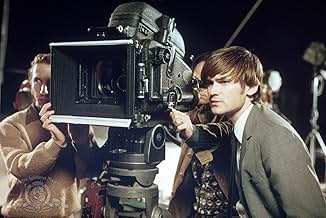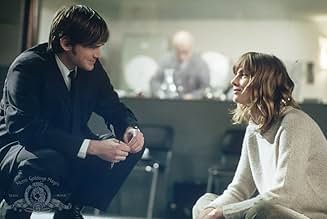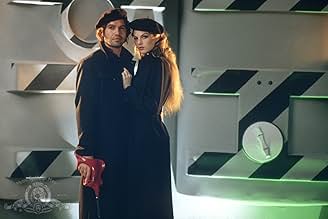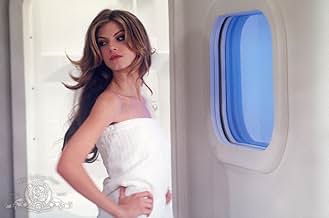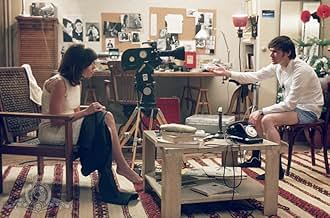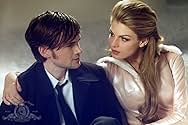IMDb-BEWERTUNG
6,2/10
5172
IHRE BEWERTUNG
Füge eine Handlung in deiner Sprache hinzuA young filmmaker in 1960s Paris juggles directing a cheesy sci-fi debacle, directing his own personal art film, coping with his crumbling relationship with his girlfriend, and realizing tha... Alles lesenA young filmmaker in 1960s Paris juggles directing a cheesy sci-fi debacle, directing his own personal art film, coping with his crumbling relationship with his girlfriend, and realizing that he's infatuated with the sci-fi film's starlet.A young filmmaker in 1960s Paris juggles directing a cheesy sci-fi debacle, directing his own personal art film, coping with his crumbling relationship with his girlfriend, and realizing that he's infatuated with the sci-fi film's starlet.
- Auszeichnungen
- 1 Nominierung insgesamt
Empfohlene Bewertungen
This film is entertaining, thoughtful and beautifully photographed, It cleverly mixes documentary with the real lives of it's characters giving a new twist to the "story within a story" genre. Every actor gives an honest performance in a story that could have easily slipped into the same old tortured artist crap that seems so popular in film today. The soundtrack is very much a part of the story in that it represents the era in which the film is set and the style in which the film within the film is set. Roman Coppola may be Francis' son but he is not a copycat.
The creative process should boggle anyone's mind. I mean if you took one look at the time and energy exerted on one motion picture you'd probably scream. Sure some movies deserve the time spent on them. Nobody is going to begrudge the creative team behind 2001: A SPACE ODYESSY or CITIZEN KANE. But what about the creative team behind HOWARD THE DUCK. Did not talented people put just as much time and energy into that film? CG is a film about the creative process thru the director working on a film just a stupid and banal as HOWARD THE DUCK.
It tells the story of a young and talented film editor named Paul (Jeremey Davies, Spanking the Monkey) and his short stint as director on a B grade science fiction film in 1969. The film about a secret agent named Dragonfly (Anglea Lindvall, New York Stories). It's Moonraker meets Charles Angels. This film is directed by a creative visionary named Andrezej (Gérard Depardieu, The Closet). After months of editing the end still needs to be reworked, and Andrezej has been thrown off the picture because his producer (Giancarlo Giannini, Hannibal) he taking for to long to finish.
Andrezej is replaced by a snotty kid named Felix DeMarco (Jason Schwartzman, Rushmore), he's the kind of guy who doesn't deserve to be where he is and everybody knows it. When tragedy strikes the new director. Paul is called in to finish the picture.
First time director Roman Coppola, has crafted a disjointed but still overly satisfying film. Making movies is a game of luck and CQ (The Morse Code phrase for Seek You) has some real moments of brilliance. It's about the lengths money men will go to make a picture, it's about compromise, and it's also about the creative quest to make an audience happy all while keeping yourself from going crazy.
Jeremy Davies is one of the most underused actor's in Hollywood. He does so well with each and every performance, even if the films suck (See Million Dollar Hotel, for example). His Paul is both nervous and yet calculated. He hides in the shadows only to jump out and surprise you. Like any number of craftsman and artisans he's the real talent and he props up those around him.
I loved how Coppola, counterpoints the silly B movie with Paul's other black and white art film. Paul is making this drippy and disjointed film at his house. It's this surreal black and white film that features disjointed takes, and exists for arts sake more than anything else. Of course it's silly and pretentious, but in the end it's all about creating your own film, and moving on with your life. Plus it's really an excuse to p*ss off his live in lover Marlene (Elodie Bouchez, Dreams of Trespas).
Marlene is a good counterpoint to Dragonfly or Valentine whom is the lead in the movie. She's the woman Paul truly lusts after. Each women stars in one of his movies and you can tell which on he thinks is a hero and which is a villain. This gives Paul a flawed dimension and these women bring out the two faces of this talented man.
Overall CQ is a tad vague. I liked it that way; something tells me if I knew what Coppola was truly trying to say it would be quite a letdown. Thankfully I will take my interpretation and leave it at that.
I also loved the B-picture itself. It was campy and silly. Like Austin Powers without the laughs, and tons more style. Lindvall was the perfect choice for Dragonfly because she looks like a Model in the Sixties. Like a Breck girl from the 60's.Plus, Billy Zane's (Titanic) small roll as Mr. E, is so goofy and yet so suave you can't help but be pulled in.
CQ is not for everyone and a nominal understanding of the creative process of film will enhance it. But if you're looking for something a little different, a little out of the ordinary, and a little weird, give CQ a try.
**** out of 5
It tells the story of a young and talented film editor named Paul (Jeremey Davies, Spanking the Monkey) and his short stint as director on a B grade science fiction film in 1969. The film about a secret agent named Dragonfly (Anglea Lindvall, New York Stories). It's Moonraker meets Charles Angels. This film is directed by a creative visionary named Andrezej (Gérard Depardieu, The Closet). After months of editing the end still needs to be reworked, and Andrezej has been thrown off the picture because his producer (Giancarlo Giannini, Hannibal) he taking for to long to finish.
Andrezej is replaced by a snotty kid named Felix DeMarco (Jason Schwartzman, Rushmore), he's the kind of guy who doesn't deserve to be where he is and everybody knows it. When tragedy strikes the new director. Paul is called in to finish the picture.
First time director Roman Coppola, has crafted a disjointed but still overly satisfying film. Making movies is a game of luck and CQ (The Morse Code phrase for Seek You) has some real moments of brilliance. It's about the lengths money men will go to make a picture, it's about compromise, and it's also about the creative quest to make an audience happy all while keeping yourself from going crazy.
Jeremy Davies is one of the most underused actor's in Hollywood. He does so well with each and every performance, even if the films suck (See Million Dollar Hotel, for example). His Paul is both nervous and yet calculated. He hides in the shadows only to jump out and surprise you. Like any number of craftsman and artisans he's the real talent and he props up those around him.
I loved how Coppola, counterpoints the silly B movie with Paul's other black and white art film. Paul is making this drippy and disjointed film at his house. It's this surreal black and white film that features disjointed takes, and exists for arts sake more than anything else. Of course it's silly and pretentious, but in the end it's all about creating your own film, and moving on with your life. Plus it's really an excuse to p*ss off his live in lover Marlene (Elodie Bouchez, Dreams of Trespas).
Marlene is a good counterpoint to Dragonfly or Valentine whom is the lead in the movie. She's the woman Paul truly lusts after. Each women stars in one of his movies and you can tell which on he thinks is a hero and which is a villain. This gives Paul a flawed dimension and these women bring out the two faces of this talented man.
Overall CQ is a tad vague. I liked it that way; something tells me if I knew what Coppola was truly trying to say it would be quite a letdown. Thankfully I will take my interpretation and leave it at that.
I also loved the B-picture itself. It was campy and silly. Like Austin Powers without the laughs, and tons more style. Lindvall was the perfect choice for Dragonfly because she looks like a Model in the Sixties. Like a Breck girl from the 60's.Plus, Billy Zane's (Titanic) small roll as Mr. E, is so goofy and yet so suave you can't help but be pulled in.
CQ is not for everyone and a nominal understanding of the creative process of film will enhance it. But if you're looking for something a little different, a little out of the ordinary, and a little weird, give CQ a try.
**** out of 5
Despite the pedigree of being made by the latest Coppola clan member to enter the feature film directorial ranks, CQ came and went from theaters when it was released a few years go. Seeing it for the first time on Reel 13 on Saturday, I'm a little stunned as to why. Roman Coppola proves to be a promising, thoughtful filmmaker and as adept a student of cinema history as his Uncle Francis. CQ is an engaging, if loosely structured movie, managing to be simultaneously inventive and derivative, borrowing from and paying homage to everything from La Dolce Vita to the Marx Brothers.
Its primary source of influence is, of course, 1968's Barbarella, here thinly veiled as the fictional "Dragonfly", as the film within the film. CQ is about how Paul, a young editor (Jeremy Davies), working on said "Dragonfly" deals with balancing his career and his relationship as he works on both the big-budget sci-fi epic and directing his own personal documentary film. This set-up provides Coppola with three different planes of action going on – real life, the black and white documentary and the colorful, sexy, futuristic world of "Dragonfly". The fun really begins when Coppola deftly uses these formats to blur the lines of fantasy and reality when Paul, in his search for himself, begins to lose sight of where the boundaries for each of these worlds lie – or if they even exist.
In addition to Coppola's stellar usage of mixed media, the other key to CQ's success is Jeremy Davies, an extremely talented and severely underused young actor who quite possibly should have won an Oscar for his work in Saving Private Ryan and at least should have been nominated for last year's Rescue Dawn. I think there are less roles for him because he seems to insist on making quirky, out-of-the-box choices. However, when a director with vision is willing to roll the dice on him, he almost always delivers an inspired performance. CQ is no exception as Davies brings a believable, uncomfortable edge to Paul. He is a character who is lost and confused, but most actors would play him with a modicum of swagger. Davies makes him neurotic without being nebbish – as if still a boy in the body a man who isn't quite sure that he wants to grow up. At the heart of Davies' performance, however, still is that extra element of quirkiness that is all his own. It's that extra layer of thought he puts in to his performance and those unusual choices he makes that allows the character to feel fresh – different than what we're used to while at the same time, wholly plausible.
After all is said and done, with all its layers of meaning and different milieus represented within it, CQ ultimately becomes a dissertation on film and the nature of filmmaking as an artform. It depicts the tendency of the artist to lose himself in his work and how said artist can learn to manipulate the art to find his way again (it's no wonder I liked it so much). In that sense, it's a beautifully realized film and another highly auspicious debut from an almost unfairly talented family.
Its primary source of influence is, of course, 1968's Barbarella, here thinly veiled as the fictional "Dragonfly", as the film within the film. CQ is about how Paul, a young editor (Jeremy Davies), working on said "Dragonfly" deals with balancing his career and his relationship as he works on both the big-budget sci-fi epic and directing his own personal documentary film. This set-up provides Coppola with three different planes of action going on – real life, the black and white documentary and the colorful, sexy, futuristic world of "Dragonfly". The fun really begins when Coppola deftly uses these formats to blur the lines of fantasy and reality when Paul, in his search for himself, begins to lose sight of where the boundaries for each of these worlds lie – or if they even exist.
In addition to Coppola's stellar usage of mixed media, the other key to CQ's success is Jeremy Davies, an extremely talented and severely underused young actor who quite possibly should have won an Oscar for his work in Saving Private Ryan and at least should have been nominated for last year's Rescue Dawn. I think there are less roles for him because he seems to insist on making quirky, out-of-the-box choices. However, when a director with vision is willing to roll the dice on him, he almost always delivers an inspired performance. CQ is no exception as Davies brings a believable, uncomfortable edge to Paul. He is a character who is lost and confused, but most actors would play him with a modicum of swagger. Davies makes him neurotic without being nebbish – as if still a boy in the body a man who isn't quite sure that he wants to grow up. At the heart of Davies' performance, however, still is that extra element of quirkiness that is all his own. It's that extra layer of thought he puts in to his performance and those unusual choices he makes that allows the character to feel fresh – different than what we're used to while at the same time, wholly plausible.
After all is said and done, with all its layers of meaning and different milieus represented within it, CQ ultimately becomes a dissertation on film and the nature of filmmaking as an artform. It depicts the tendency of the artist to lose himself in his work and how said artist can learn to manipulate the art to find his way again (it's no wonder I liked it so much). In that sense, it's a beautifully realized film and another highly auspicious debut from an almost unfairly talented family.
Watching the trailer for this movie, I couldn't help but feel excited.
Look at all the swank 60's spy movie references!
Well ... this wasn't the movie I'd hoped for. I believe that "CQ" is Roman Coppola's (son of famous Francis Ford Coppola) first feature-length movie. And I suppose that all first-time directors flail and hick-up in their first (hell, even second and third) films.
But Coppola very blatantly tries to conceal all his director and writer disabilities by shrouding the film with 60's pop-culture trivia ... something that I'm sure his "hipster" handbook directed him to do.
The premise involves an American attempting to edit a ridiculously avant-gard sci-fi/spy Modesty Blaise-esque movie in Paris ... while in his personal time he whines and moans about how he isn't adept enough to sustain a meaningful relationship ... all this through the eyes of a camera. And whilst he records his day-to-day life on film ... he neglects his stunning french girlfriend.
So ... our young American in Paris ends up taking the reigns of the spy movie and plenty of hijinx ensue.
It isn't hard to predict how the movie will end. And if you wait around long enough and can somehow see past Coppola's bloated, pretentious and pedestrian writing and direction ... then you'll have earned a shining ticket to complain about how great this movie COULD have been.
And people wonder why nobody remembers (or wants to remember) this movie. Chalk it all up to the futile attempts of a son of a great director to become more than his father.
Remember ... even old Francis Ford had to LEARN filmmaking. Anyone ever see "Dementia 13?" It wasn't a HORRIBLE movie ... but then again ... it wasn't "Apocalypse Now," either.
Roman's sister, Sophia Coppola has done so interesting work. If anyone inherited Francis Ford's filmmaking genes ... my guess is that it's her. "The Virgin Suicides" is a really excellent movie. "Lost in Translation" wasn't bad either.
So ... Roman ... keep on making those music videos. Your video for "The Strokes" was painfully dull ... but it was a little easier for me to switch channels.
Look at all the swank 60's spy movie references!
Well ... this wasn't the movie I'd hoped for. I believe that "CQ" is Roman Coppola's (son of famous Francis Ford Coppola) first feature-length movie. And I suppose that all first-time directors flail and hick-up in their first (hell, even second and third) films.
But Coppola very blatantly tries to conceal all his director and writer disabilities by shrouding the film with 60's pop-culture trivia ... something that I'm sure his "hipster" handbook directed him to do.
The premise involves an American attempting to edit a ridiculously avant-gard sci-fi/spy Modesty Blaise-esque movie in Paris ... while in his personal time he whines and moans about how he isn't adept enough to sustain a meaningful relationship ... all this through the eyes of a camera. And whilst he records his day-to-day life on film ... he neglects his stunning french girlfriend.
So ... our young American in Paris ends up taking the reigns of the spy movie and plenty of hijinx ensue.
It isn't hard to predict how the movie will end. And if you wait around long enough and can somehow see past Coppola's bloated, pretentious and pedestrian writing and direction ... then you'll have earned a shining ticket to complain about how great this movie COULD have been.
And people wonder why nobody remembers (or wants to remember) this movie. Chalk it all up to the futile attempts of a son of a great director to become more than his father.
Remember ... even old Francis Ford had to LEARN filmmaking. Anyone ever see "Dementia 13?" It wasn't a HORRIBLE movie ... but then again ... it wasn't "Apocalypse Now," either.
Roman's sister, Sophia Coppola has done so interesting work. If anyone inherited Francis Ford's filmmaking genes ... my guess is that it's her. "The Virgin Suicides" is a really excellent movie. "Lost in Translation" wasn't bad either.
So ... Roman ... keep on making those music videos. Your video for "The Strokes" was painfully dull ... but it was a little easier for me to switch channels.
I admit I was just going to see this film for the close-ups of my favorite actor Billy Zane because its been far too long since I've seen his face on the big screen. However, the film was actually well done and had an interesting 60's tone which is pulled off very well. But the one thing that bothered me was why the title "CQ" ? It had one brief reference to CQ > seeks you but not enough to name a whole movie after it. Anyway, Billy did a good job and was very entertaining so for all you Billy fans, go see CQ if you can find it playing near you.
Wusstest du schon
- WissenswertesAfter being fired, Andrezej puts his fist through the screening room door. This is a reference to Francis Ford Coppola (father of director Roman Coppola) and his short temper. When the editors get a framed section of the destroyed wall, it is actually a portion of a wall the elder Coppola wrecked in his early directing days.
- PatzerIn the tunnel, when Dragonfly swerves in reverse, there already are skid marks on the ground along the path taken by the car's tires.
- VerbindungenFeatured in On the Set of 'CQ' (2002)
- SoundtracksCe Soir, Je Vais Boire
Lyrics by Gilles Thibaut
Music by Bruno Canfora
Performed by Claude François
Courtesy of Universal International Music, B.V.
Under license from Universal Music Enterprises
Top-Auswahl
Melde dich zum Bewerten an und greife auf die Watchlist für personalisierte Empfehlungen zu.
- How long is CQ?Powered by Alexa
Details
- Erscheinungsdatum
- Herkunftsländer
- Offizieller Standort
- Sprachen
- Auch bekannt als
- Агент «Стрекоза»
- Drehorte
- Produktionsfirmen
- Weitere beteiligte Unternehmen bei IMDbPro anzeigen
Box Office
- Budget
- 7.000.000 $ (geschätzt)
- Bruttoertrag in den USA und Kanada
- 414.358 $
- Eröffnungswochenende in den USA und in Kanada
- 54.942 $
- 27. Mai 2002
- Weltweiter Bruttoertrag
- 499.891 $
- Laufzeit1 Stunde 28 Minuten
- Farbe
- Sound-Mix
- Seitenverhältnis
- 1.85 : 1
Zu dieser Seite beitragen
Bearbeitung vorschlagen oder fehlenden Inhalt hinzufügen



